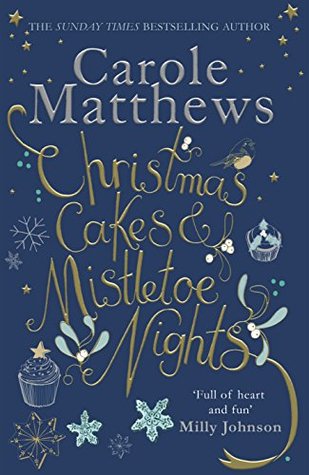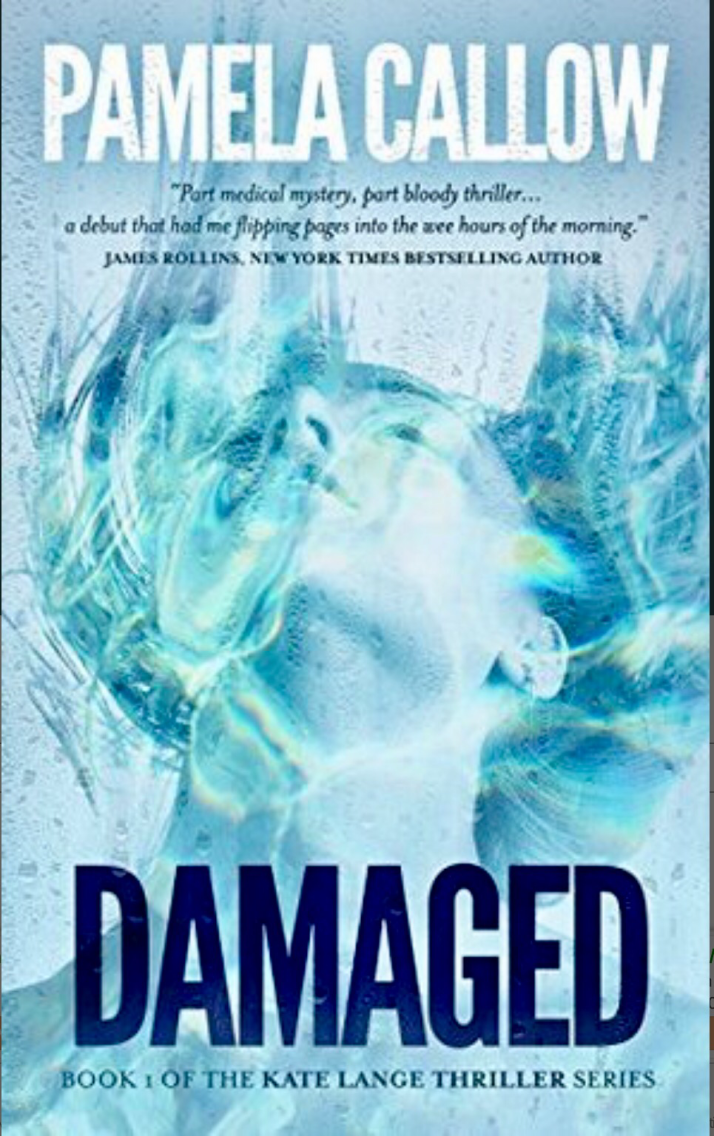Oh, dear, it’s already Sunday. It’s the end of the weekend, you haven’t done everything you wanted to, but you’re already too deep in the Sunday blues to think about doing them anyway. You want something to inspire you, to make you feel creative and ready to fight the world again, right?
Well, I don’t know if this comic will manage to do that, but it sure will make you think about art, creativity and life expectations. The Sculptor is a graphic novel realised by Scott McCloud, also known for his non-fictional cartoons on how to create comics.
The Sculptorby
Scott McCloud
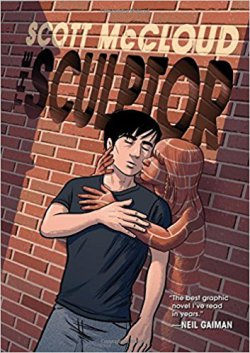
Written in 2015, this comic book has received really positive reviews online. I first stumbled on it in the end of 2016, as I believe the French translation came out around that time. It was everywhere in the libraries and the cover really attracted my eyes. In France, the cover is blue, with the face of David Smith in big. His concerned look caught my eyes every time and I ended up borrowing it at my uni’s library. I’ll post the French cover on our Instagram tomorrow, if you want to check it out!
Now that I had borrowed the book, I rapidly started reading it. All I knew from the summary at the back of the book was that The Sculptor told the story of an artist named David Smith who struggled with his art and that this graphic novel was a modern version of the Faustian pact.
I knew loads about the Faustian pact, as I had been studying its diverse rewriting in uni multiple times. But for those of you who don’t, here’s quickly the commonly known story: Faust was a highly successful scholar, recognised by everyone and who had students following him. However, he felt disdain for his knowledge as it seemed to him that it was insufficient, limited and frustrating. The knowledge a simple man could acquire on Earth was no more enough for his lust of knowledge. The Devil and the Angels had made a pact, the latter saying that a man like Faust would never deny his God. The Devil, incarnated by Mephistopheles, argued that while he was still on Earth he was granted all-powers to make Faust deviate from the “right path”. He thus descended to Earth and promised Faust what he wanted most: unlimited knowledge, pleasures that no man could obtain by himself, granted he gave him his life once the years negotiated had come. There has been loads of writings around Faust, its a tale that fascinates people. You can read Marlowe, Goethe, Valéry… and now, Scott McCloud.
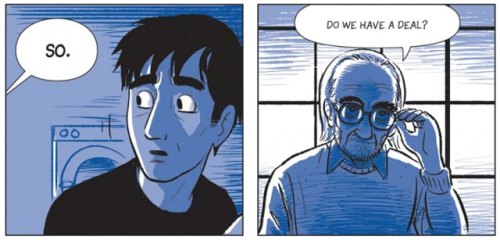
Whilst every author had a particular inclination on why Faust would give his soul to the evil, Scott McCloud here touched upon a subject that is truly relatable to 21st century readers. His main character, David, is an artist whose success is not happening. He has talent, but he can’t find the perfect artwork to create, and he can’t do it. He’s limited by his manual capacities, by his time, by money, by everything. He’s driven to a corner, ready to give it all up when he meets his own Mephistopheles, in the form of his uncle Victor – because Death is everywhere, right? And Death offers him the very same deal he offered all those past Faust: unlimited power of creation, granted for a limited time. All of the pacts happen alike: there is a trial period, which the protagonist will have to certify.
First, he doesn’t understand it. He doesn’t believe it, even. His day goes even more crazy, he stumbles upon an Angel, really, which will give him balance later on in his life. An Angel, however, that is relatable to us: we all play a game, showing ourselves to people in our best form, when we are truly crumbling inside. His Angel is a depiction of loads of 21st century readers, opening up to many cultures, gaining from diverse friends, being a child of everywhere, and appearing as a strong ass lady but, deep inside, has troubles, issues and mental instability.
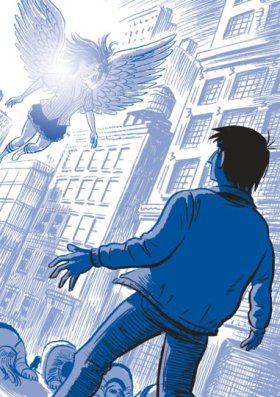
My review is very vague, I’m sorry for that, but as you might have understood since, I really hate spoilers and want all of you to read what I propose to you with a feeling of real discovery and not second-hand reading, right? Alright then, he meets with his Angel and his day goes on. And when midnight strikes, he realises something. Uncle Victor wasn’t only talking nonsense. He felt something, in his hands. He felt power, possibilities. He had been granted what he wanted most: the possibility to do whatever he wanted with his hands. He could sculpt every metal, he could make it take the form he wanted, everything was not possible.
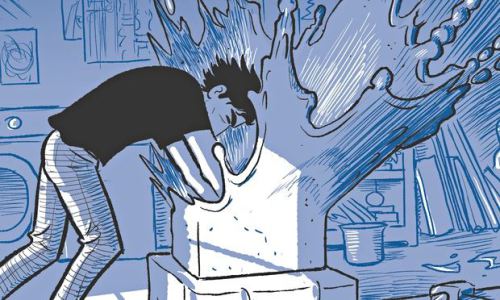
There was no more excuses to success, right? And that’s where Scott McCloud’s story really hits: we all believe that given the possibility to do whatever we wanted we could actually realise our best oeuvre d’art, the one we had always imagined and that could finally take form. However, it’s not that easy. David is met with social pressure, with rigged jurys. He’s met with treason and hardships. He’s also met with the blank page syndrome. What to sculpt? What would make an impact? What would be his One artwork? And after years of being hidden, a niche artist, what would we want most? To be seen. So he went out there, he created art in the streets, he made himself seeable by everyone. His name was on every lips, his artwork was everywhere. But time passed – and still, he hadn’t realised his One artwork.
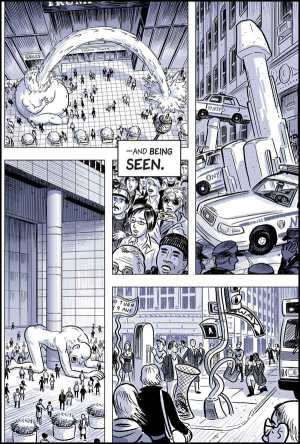
I don’t know if it’s because I’m a writer and thus everything David felt resonated in me, but I feel like his story and his hardships are relatable to everyone. We’ve all been confronted to a project we would like to give all of our time to, to have all the mediums and capacity to make it reach its peak, but we’re unable to do so. We want to be seen : but being seen comes with its cons. It can have an impact on your art, as you’re little by little only thriving to find the one thing that will make you seen by others. It can have an impact on your relationships, as you’ll devote everything to that one goal, being seen. But you see time fading away, you see your capacities diminishing and you’re left wondering if you’ll ever succeed, if you’ll ever create that One artwork you wanted.
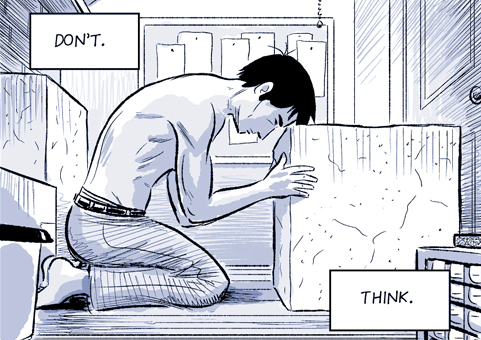
I think you quite understood why I love this graphic novel by now: it tackles different subjects that are quite close to my heart and I enjoyed the almost 500 pages book that took time to draw them out. It’s all about art, about time and being able to create what you want, it’s all about relationships and struggling with passion and balance, it’s all about 21st century woman, with hardships and fights and couple struggles. It’s a well rounded novel, with subjects to please everyone and metaphors that will make you think. Of course, it’s wonderfully drawn as well. It’s very vivid, some faces are still glued in my mind, some artworks still amaze me every time I see them.
I love how Scott McCloud modernised Faust, making his hardships and his existentialism a 21st century orientated one.
So now, go read that graphic novel, fall in love with the imagery and tell me all about your favorite scene, your favorite sculpture and, more so, what you thought of the ending! Cause damn, that ending.
Lots of love,
Elissa
- More

